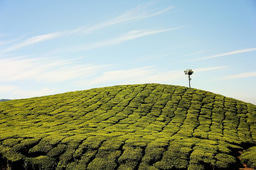Announcing the Winners of the 2025 JEET Emerging Scientist Award in Ethnobiology
Published in Social Sciences, Ecology & Evolution, and Sustainability

The JEET Emerging Scientist Award in Ethnobiology was established in 2025 to honor early-career researchers who have made outstanding contributions to the fields of Ethnobiology and Ethnomedicine. This annual award recognizes scholars whose work not only advances scientific understanding but also uplifts local communities and Indigenous Peoples through inclusive, respectful, and impactful research.
A vision for inclusive science
Ethnobiology and Ethnomedicine are disciplines deeply rooted in the knowledge systems of local and Indigenous communities. The JEET Prize celebrates those who have worked collaboratively with these communities to document, analyze, and interpret traditional ecological and medical knowledge—especially among marginalized and underrepresented groups. By spotlighting these efforts, the award aims to revitalize local knowledge systems and inspire future projects that foster wellbeing and sustainability.
2025 Winner: Naji Sulaiman
University of Gastronomic Sciences, Italy
Prize Committee Motivation:
Naji Sulaiman is a trailblazing ethnobiologist whose research has significantly enriched our understanding of traditional ecological knowledge in the Mediterranean and Middle East. As Assistant Professor of Environmental and Applied Botany at UNISG, his ethnobotanical studies have highlighted the critical role of wild plant knowledge in times of crisis, offering insights into food security and sustainable food systems.
His prolific publication record includes highly cited articles in Foods, Biology, and Economic Botany. In 2024, he received the International Doctoral Award from the Italian Botanical Society for his PhD on wild plant use during the Syrian conflict. Beyond academia, Sulaiman actively promotes traditional plant knowledge through editorial and peer-review roles in leading journals. His community-based approach and dedication to preserving cultural heritage make him a standout leader in the field.
“I am deeply honoured to receive the JEET Emerging Scientist Award in Ethnobiology. This recognition is greatly meaningful, not only on a personal level, but also for the mission of ethnobiology in documenting and preserving traditional ecological knowledge, especially among marginalised and threatened communities, and in regions affected by crises. My research is inspired by the resilience, ingenuity, and deep connection of local communities to their natural environment. Looking ahead, I aim to continue community-engaged, field-based research that fosters ethnobiological practices and promotes sustainable traditional food systems. Just as important, I aim to keep defending the cultural identity of local communities against marginalisation, cultural oppression, homogenisation, and globalisation by showcasing their unique biocultural knowledge. I believe preserving ethnobiological knowledge is more vital than ever for future generations.”
— Naji Sulaiman
Runner-Up: Cheng Zhuo
Minzu University of China, China
Prize Committee Motivation:
Cheng Zhuo has conducted pioneering research with the Dulong people of Yunnan Province, documenting their edible and medicinal plants, traditional beekeeping, bamboo weaving, and sustainable resource practices. His work offers vital perspectives on Indigenous knowledge and biodiversity conservation.
With 16 first-author papers in top journals, Cheng’s fieldwork has led to the discovery of three new plant species. He has received multiple accolades, including the China Man and the Biosphere Youth Talent Project grant. His multilingual and culturally sensitive approach has broadened the reach of ethnobiology across Asia.
"Receiving the prestigious JEET Award is both an immense honor and a profound encouragement. This recognition not only affirms the past efforts of my team and me but also unlocks new possibilities—expanding academic discourse and fostering future collaborations that can drive meaningful progress in our field. My research is driven by two deep-rooted responsibilities: First, the urgent mission of rescue conservation—under the tide of globalization, the traditional knowledge of many ethnic minorities is vanishing at an alarming rate, a reality I have repeatedly witnessed during my fieldwork. This urgency compels me to race against time. Second, the scientific inheritance of this knowledge—guided by my mentor, Professor Long Chunlin, our team innovatively employs modern technologies such as genomics and ecological modeling to uncover the scientific principles behind traditional wisdom. This interdisciplinary approach breathes new life into ancient knowledge. Standing at this new starting point with the JEET Award, I will continue to delve deeper into ethnobiological research on China's lesser-populated ethnic groups, establishing a more systematic database of traditional knowledge. Additionally, I will explore the application of traditional ecological wisdom in modern sustainable development, such as biodiversity conservation and eco-agriculture. This award is not an endpoint but a torch. I hope to use its light to inspire greater appreciation for ethnobotany and to ensure that the roots of scientific research remain firmly grounded in the soil of biocultural diversity."
— Cheng Zhuo
Runner-Up: Emiel De Meyer
Ghent University, Belgium
Prize Committee Motivation:
Emiel De Meyer brings a multidisciplinary lens to ethnobiology, blending biological engineering, plant sciences, and social sciences. His PhD on medicinal plant use in urban areas has already led to six published papers, with more in review.
Praised as “a remarkably original thinker,” Emiel specializes in African ethnobotany, contributing to initiatives like the One Planet Fellowship and African Women in Agricultural Research and Development. Fluent in Dutch, English, and French, he also serves as an editor for Ethnobotany Research and Applications, focusing on African ethnobotanical studies.
"Ever since I became aware of the natural world around me, I have been fascinated by how people use the living organisms that surround them. Playing in the forest where I grew up, I created my own small ethnobotanical world, not knowing that something called ethnobiology even existed. Conducting ethnobotanical research as a young researcher has consumed me, spit me out, and consumed me again. The longer I do it, the more it becomes part of my identity and daily life. Being recognised as an ethnobiologist through the JEET Prize makes me feel that I am finding my place among the very researchers I began admiring when I was first introduced to the world of ethnobiology. As this has become such a central part of my identity, it means a lot to me. While much of the research funding goes to what is labelled “innovative” and “groundbreaking,” I continue to believe that solutions to many socio-environmental problems are embedded within Indigenous, traditional, and locally adapted knowledge; can be found by listening to the voices of those who have long been disregarded and unheard; and lie in recognising and valuing both these people and their knowledge systems. The JEET Prize fuels my fire to keep advocating for this through research, in the hope that it may somehow contribute to a more equal, inclusive, and prosperous world."
— Emiel De Meyer
Honoring the shortlisted candidates
The JEET Prize Committee and the Journal of Ethnobiology and Ethnomedicine extend heartfelt thanks to all shortlisted candidates. Their submissions were praised for their quality, innovation, and commitment to community-based research.
Shortlisted Scholars:
- Abdullah Abdullah – Kunming Institute of Botany, China
- Anna Karolina Martins Borges – Universidade Estadual da Paraíba, Brazil
- Ashebir Awoke – Mizan Tepi University, Ethiopia
- Binsheng Luo – Lushan Botanical Garden, Chinese Academy of Sciences, China
- Cheikh Yebouk – ISET Rosso, Mauritania
- Dipak Khadka – Environment Protection and Study Center, Nepal
- Janine Donhouede – University of Abomey-Calavi, Benin
- Kavi Oza – The Maharaja Sayajirao University of Baroda, India
- Xiaoyong Ding – Yunnan University, China
Looking Ahead
By recognizing and celebrating these emerging scientists, the JEET Prize not only honors individual excellence but also strengthens the global ethnobiology community. We look forward to seeing how these scholars continue to shape the future of inclusive, community-driven research.
Stay tuned for next year's edition!
Follow the Topic
-
Journal of Ethnobiology and Ethnomedicine

This journal publishes original research focusing on cultural perceptions of nature and of human and animal health. It invites research articles, reviews and commentaries concerning the investigations of the inextricable links between human societies and nature, food, and health.
What are SDG Topics?
An introduction to Sustainable Development Goals (SDGs) Topics and their role in highlighting sustainable development research.
Continue reading announcementRelated Collections
With Collections, you can get published faster and increase your visibility.
Ethnobiology of the islands
This Collection examines the socio-ecological systems of "islands" and coastal areas worldwide, focusing on the relationship between humans and biota and even non-biotic components and the implications of these interactions over time and space. Cross-cultural analysis, indigenous perspectives, and the complex dynamics between the local knowledge of these "isles" (especially the most peripheral and marginalized ones) and the contiguous mainland are particularly welcome. Issues related to the effects of unsustainable tourism on local knowledge systems are also very appropriate.
The projection of the contributions should aim to foster the community-centered sustainable management of marine and coastal resources and envision new paths in environmental education and political ecology.
This Collection supports and amplifies research related to SDG 14, Life Below Water and SDG 15, Life on Land.
All submissions in this collection undergo the journal’s standard peer review process. Similarly, all manuscripts authored by a Guest Editor(s) will be handled by the Editor-in-Chief. As an open access publication, this journal levies an article processing fee (details here). We recognize that many key stakeholders may not have access to such resources and are committed to supporting participation in this issue wherever resources are a barrier. For more information about what support may be available, please visit OA funding and support, or email OAfundingpolicy@springernature.com or the Editor-in-Chief.
Publishing Model: Open Access
Deadline: Jul 03, 2026
Small-scale farming and ethnobiology – Bridging local knowledge, biodiversity, and cultural landscapes
The importance of deepening our understanding of small-scale farming and its intersections with ethnobiology and ethnoecology cannot be overstated. These fields illuminate not only traditional agricultural practices that have sustained communities for generations, but also contemporary locally adapted sustainable practices. Together, they underscore the vital role of local knowledge in preserving biodiversity and shaping cultural landscapes.
Recent research has highlighted the intricate relationships between local communities and their territories and ecosystems, showing how both traditional and locally adapted innovative farming methods can enhance biodiversity and promote ecological balance. These insights are essential for informing sustainable land management and ecosystem resilience.
Looking ahead, continued exploration in this area holds the potential to yield transformative insights. Integrating traditional knowledge with organic and agroecological practices—which may be ancient, innovative, or retro-innovative—can lead to more sustainable and resilient food and agriculture systems. This research is not only key to preserving cultural heritage but also to addressing urgent global challenges related to food security and environmental sustainability.
Topics of interest include, but are not limited to:
Local Knowledge & Sustainability
• Local Knowledge Systems in Agriculture
• Traditional Agricultural Practices and Sustainability
• Indigenous Knowledge and Climate Resilience
Biodiversity & Conservation
• Biodiversity Conservation in Small-Scale Farming
• Ethnobiological Approaches to Conservation
• Ethnoecological Perspectives on Land Use
Agroecology, Organic Farming & Cultural Landscapes
• Agroecological & Organic Practices and Transitions
• Innovation and Local Knowledge in Agroecological and Organic Systems
• Cultural Landscapes and Food Sovereignty.
This Collection supports and amplifies research related to SDG 2, Zero hunger, SDG 12, Responsible consumption and production, and SDG 15, Life on land.
All submissions in this collection undergo the journal’s standard peer review process. Similarly, all manuscripts authored by a Guest Editor(s) will be handled by the Editor-in-Chief. As an open access publication, this journal levies an article processing fee (details here). We recognize that many key stakeholders may not have access to such resources and are committed to supporting participation in this issue wherever resources are a barrier. For more information about what support may be available, please visit OA funding and support, or email OAfundingpolicy@springernature.com or the Editor-in-Chief.
Publishing Model: Open Access
Deadline: Jun 22, 2026








Please sign in or register for FREE
If you are a registered user on Research Communities by Springer Nature, please sign in
On behalf of Mizan Tepi University, it is my great pleasure to congratulate you on being awarded the JEET Emerging Scientist Award in Ethnobiology.
Established in 2025, this prestigious award recognizes early-career researchers whose work demonstrates both scientific excellence and meaningful impact. Your contributions to Ethnobiology and Ethnomedicine truly embody these ideals expanding knowledge while uplifting local communities and honoring Indigenous Peoples through inclusive and respectful research.
This honor is not only a reflection of your dedication and innovative scholarship but also of your commitment to ensuring that science remains deeply connected to people, cultures, and the environment. We are confident that your future work will continue to inspire, foster collaboration, and set new standards of excellence in the field.
I am also very proud that my name, Ashebir Awoke, is listed among the shortlisted candidates for the JEET Prize Award an honor I deeply cherish.
Once again, congratulations on this well-deserved recognition. We look forward to celebrating the important contributions you will continue to make in the years ahead.
With warm regards and best wishes,
Ashebir Awoke
Mizan Tepi University
Thank you for this - and congratulations again for being among the shortlisted candidates for this Prize!